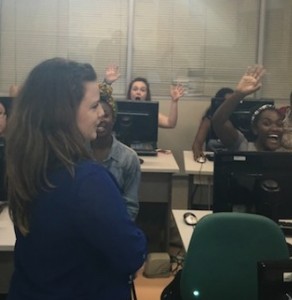I cannot believe that tomorrow is our final day at ISC. As I take a break from work on our final presentation to write this blog post, I feel grateful, energized, and inspired. Yet, also a bit melancholy as our flight back to Atlanta draws near. Yesterday, I said my goodbyes to Freddy, our most knowledgeable tour guide, prankster, traveler and new life-long friend. Today was my last day with Mauricio, our extraordinarily charming and patient Portuguese instructor, without whom I would still be asking for agua de cocô instead of agua de côco. (Trust me, that’s an important distinction.) Tomorrow, we’ll say farewell to the all of the faculty at the ISC who have taken the time to share their work and answer our questions. I am so thankful for all the people who have been willing to share this, the beautiful state of Bahia, with us for these three very short weeks. I have learned more than I could I have imagined—about collective health, world history, Brazilian culture, my professors, my classmates, and myself.

Freddy let us come with him while he did his grocery shopping this weekend. Mercado de Sao Joaquim was beautiful!
Today we had the opportunity to explore some of the health information datasets that are made publicly available by the Brazilian ministry of health. Carol, who has been with us throughout our time here at ISC, told us a bit about the history of these information systems, and almost glowed with pride as she described the sheer amount of information available to anyone who wishes to peruse it—“from the door-guy to the president.” These datasets, to me, represent yet another way that this nation strives for transparency and invests in its citizens. Anyone who wants to can know the prevalence of a disease in the population, who’s at risk, where the risk is highest, and how much the government is spending on it. Knowledge is power, is it not? Plus, as a data nerd, I have to admit that browsing through these databases was kind of fun.
The quote that forms the title of this blog post is paraphrased from the beginning of a comic book series, Praga (in English, Plague), which is one of Carol’s favorites. I suspect that Carol is a fellow data nerd, and this quote resonated with her as it also resonates with me. I think it’s safe to say that we have all seen how Brazilians love—from the inspirational NGOs working within their communities to our warm and protective host moms feeding us until we pop. In our lectures at ISC and in all of our interactions with tour guides, teachers and community leaders, we’ve seen how Brazilians work. (On that front, we could all learn a little something from Brazil on how to get things done). And—as morbid as it is—today we learned how to understand how Brazilians die. That is, at least we learned about the very complex combination of data points that can be pulled together to paint a two-dimensional picture of health in Brazil. Without every single one of these three components (loving, working, dying), I can honestly say that this experience in Salvador would have been incomplete.


